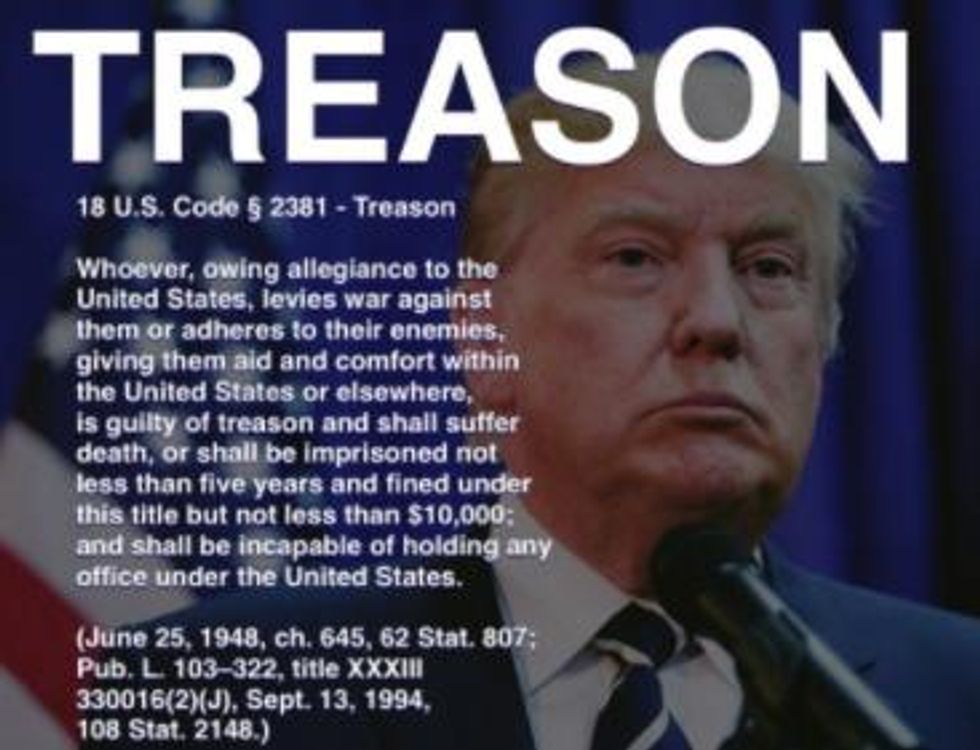A specter of treason hovers over Donald Trump. He has brought it on himself by dismissing a bipartisan call for an investigation of Russia's hacking of the Democratic National Committee as a "ridiculous" political attack on the legitimacy of his election as president.
Seventeen US national intelligence agencies have unanimously concluded that Russia engaged in cyber-warfare against the US presidential campaign. The lead agency, the CIA, has reached the further conclusion that Russia's hacking was intended to influence the election in favor of Trump.
Admiral Michael Rogers, director of the National Security Agency and commander of the US Cyber Command, has stated, "This was not something that was done casually, this was not something that was done by chance. This was not a target that was selected purely arbitrarily. This was a conscious effort by a nation state to attempt to achieve a specific effect." On Thursday, a senior intelligence official disclosed that there is substantial evidence that Russian President Vladimir Putin himself authorized the cyber-attack.
Why does Trump publicly reject these intelligence agency conclusions and the bipartisan proposal for a congressional investigation? As president-elect, he should have a strong interest in presenting a united front against Russia's interference with the electoral process at the core of American democracy.
There are several possible explanations for Trump's position. They are not mutually exclusive. First, he may be trying to shore up his political standing before the Electoral College vote on Monday. Second, he may be attempting to undermine the credibility of US intelligence agencies in advance of his taking office so that he can intimidate them and have a freer hand in reshaping the intelligence product to suit his objectives. Third, he may be testing his ability to go over the heads of intelligence professionals and congressional critics and persuade the American public to follow his version of the truth about national security threats. And finally, he may be seeking to cover up evidence of involvement or prior knowledge by members of his campaign team or himself in the Russian cyber-attack.
In each case the president-elect is inviting an interpretation that his behavior is treasonous.
The federal crime of treason is committed by a person "owing allegiance to the United States who . . . adheres to their enemies, giving them aid or comfort," and misprision of treason is committed by a person "having knowledge of the commission of any treason [who] conceals and does not disclose" the crime.
By denigrating or seeking to prevent an investigation of the Russian cyber-attack Trump is giving aid or comfort to an enemy of the United States, a crime that is enhanced if the fourth explanation applies — that he is in fact seeking to cover up his staff's or his own involvement in or prior knowledge of the attack.
There is no direct evidence that the president-elect was involved or knew in advance about the Russian government's actions. But the circumstances underscore the nation's need for a full investigation.
Paul Manafort, Trump's former campaign manager, has had extensive political dealings with the Russian government. Trump's designate for National Security Adviser, Lt. Gen. Michael Flynn, has appeared as a commentator for Russian state television and sat with Vladimir Putin at a Russian gala. As a candidate, Trump repeatedly praised Putin and took positions favorable to the Russian government. As reported by the New York Times, the president-elect's son, Donald Trump Jr., told a real estate gathering in 2008 that "Russians make up a pretty disproportionate cross-section of a lot of our assets," adding, "we see a lot of money pouring in from Russia." Two days after the election, Russia's deputy foreign minister, Sergei Ryabokov, was quoted by the Times as saying that "there were contacts" between Moscow and the Trump campaign, and that members of the campaign staff "were staying in touch with Russian representatives."
In light of these circumstances, Trump should seek to clear the air by endorsing the proposed investigation of the Russian hacking scandal. For him to continue to deny Russia's cyber-attack and resist the investigation invites a specter of treason to hover over the president-elect.
John Shattuck, a former assistant secretary of state for democracy, human rights and labor, is professor of practice in diplomacy at the Fletcher School of Law and Diplomacy and senior fellow at the Harvard Kennedy School's Carr Center for Human Rights Policy.
This article was published in the Boston Globe on December 16, 2016
###
December 18, 2016


